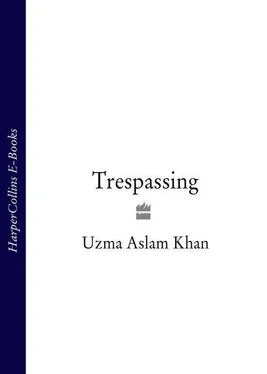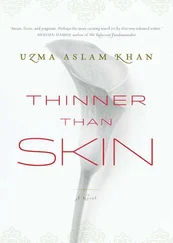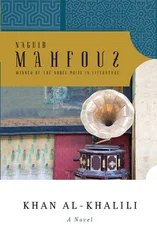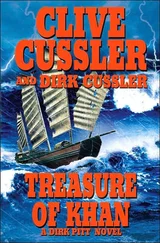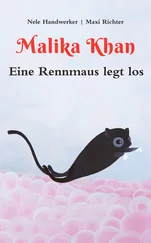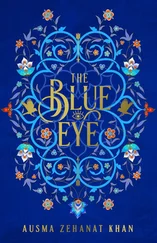But the best awaited him at the back. Here was the most beautiful woman Salaamat had ever seen. She had eyes the size of his palm, a sensuous nose, and plum-like lips half hidden behind a flimsy cloth held in a henna-dipped hand. On her right side was written, Look. On her left, But With Love. She did exactly that to him.
Salaamat was spellbound. The harder he stared the more certain he felt that she blinked, then blinked again. Her lips twitched in a smile she attempted to restrain, but failing that, she covered more of her face with the transparent dupatta.
‘Ah, I see you’ve met Rani,’ said a voice. Salaamat forced himself away from the picture. It was Chikna. ‘She’s a naughty one, I’d be careful. And don’t let Hero see you get too close. He’s very jealous.’
‘Hero?’
‘Him,’ Chikna pointed to the skinny man who was painting two buses down. ‘You two already started on the wrong foot. And now Rani seems to find you as pretty as I do.’ He tilted his head and raised a brow saucily.
‘What does Hero do here?’ asked Salaamat.
‘He’s our painter. He made Rani. He loves everything he does. He’s in love with himself.’ Chikna tweaked Rani’s cheek roughly.
Salaamat had to stop himself from fighting him, for he could hear Rani wince. ‘I want to make a bus just like this one,’ he blurted. ‘I want to learn to make all these things. Including her.’ Rani hid behind her cloth and Chikna threw his bald head back and laughed.
JULY — DECEMBER 1984
For the next several months, daily, Salaamat was told to go back home. Everything about him — his looks, accent, language, carriage — was mocked and shredded by the thirty or so workers who poured their lives out on bus art. All of them belonged to one of two groups. The Punjabis, like Handsome and his family, did most of the metal work. And the Pathans, like Hero, handled the painting. Salaamat alone belonged to a third group. He became the ajnabi. The alien.
Perhaps Chikna told Hero what Salaamat had confessed his first day: that he wanted to paint as well as him. Since the very next day till the end of Salaamat’s first year, Hero would never let Salaamat near him while he worked. If he came too close, Hero would wrinkle his nose, ‘Where’s this rotten smell coming from? Oh! It’s the fish.’ And then he and the other Pathans would frantically wave the imagined odor away.
Though he kept his left ear to them, it was hardly a friend: it carried enough taunts to make the drums roll and the dam threaten to break. How dare they call him the outsider when it was his people who were the original inhabitants of Karachi? All around him — the buses, streets, shops, migrants from other provinces, and now, refugees from Afghanistan — all were mere appendages to a place that for centuries had thrived as a tranquil fishing village. But now those villages were pushed to the periphery, and the native populations forced to work under outsiders who claimed the city belonged to them. In a sense, his employment here was no less shameful than his mother’s at the shrimp factory; they both worked for those who displaced them. Perhaps hers was less shameful — he’d still not earned a paisa from his labor. He fumed, banging strips of chamak pati into twisted shapes, peeling off stickers from Japan, putting the lot together on the body of the glowing buses. And then he stepped back and admired what he’d done. The old technique of overcoming rage returned to him.
He focused on one beautiful thing.
In the evenings, when the workers had left and Handsome scratched his ballooning stomach and gossiped with his younger brother Chikna, Salaamat’s technique began to evolve. He no longer let the giant turtle take him across smooth seas to a safer place. He now grasped Rani. Not in any ocean, but right there, in the dark and littered storeroom that was his sleeping cell.
He cleared a fourth of the space to stretch in, and over the weeks, his encounters with Rani grew increasingly fierce. At first he only lay with her in his arms, gently nibbling her full lips. Then he began rubbing her tunic. Then he got impatient. So did she. One day Rani brushed up against him and moaned, ‘Hurry!’ He clicked his tongue, clutched her two henna-doused hands roughly in one of his own and smacked them. Then he pushed the small, pearl button at the top of her kurta out of the buttonhole with his tongue and teeth. At the third pearl he sank in her cleavage, pecking at her soft breasts while she yelped. He tightened his grasp of her hands and pushed her neck back to bare more flesh. Her breasts were enormous and smooth. He lifted each with the back of his free hand so it grew even rounder. Then he yanked each nipple with his teeth and tongue the way he had the pearl buttons. She screamed. Feverishly, he threw off her shalwar. When she struggled, before parting her legs, he squeezed her neck. That silenced her. From now on, this was how it had to be.
The next morning, he rushed out the room to check on the seventh bus. His greatest fear was its completion. The bus still needed some touching up — the owner wanted the interior throbbing with heart-shaped lights, and these had still to be made. Salaamat dreaded the day the hearts went up. Though he was swiftly learning to work with steel almost as well as any Punjabi, he’d still never held a brush. He was still very, very far away from replacing Rani when she left.
But she stayed with him, the only thing in the world that was his.
During meals with Handsome’s family, Salaamat listened quietly to the chatter. Above them lurked a portrait of the General, Handsome’s hero. Handsome told of his two nephews who were being trained to fight the Soviets in Afghanistan. He looked up at the portrait and blessed the General. Then he blessed Amreeka for training and arming the freedom fighters, thundering, ‘We are Amreeka’s best allies, and they are ours. With their help, we are coming closer to saving Islam.’ Shoveling hunks of meat in his enormous mouth, he spoke next of the many anti-Soviet rallies organized by the religious parties to whom Amreeka was giving aid.
During the day, Handsome’s family kept apart from the Pathans and vice versa. What little Salaamat managed to hear of the latter’s chatter was no different from Handsome’s. In fact, Hero and his friends had more than two nephews between them joining the war. They seemed to know dozens of boys up in the mountains, boys much younger than Salaamat, who were learning to load and use weapons he couldn’t even imagine. It was a community of young Heroes. Why wouldn’t Handsome be pleased with that?
He soon had an answer: thousands of war refugees were pouring into Peshawar daily, pushing some of the local residents south to Karachi. Of these, too many were in the bus-body-making business. If this continued, the Pathans would drive the Punjabis out. Those who’d pushed villagers like Salaamat to the edge fiercely resented being pushed out too.
At night, before taking Rani, Salaamat constructed a comical scenario in his mind.
Hundreds of men were packed into a small space like his sleeping cell. The door kept opening and yet more were shoved in. Soon there wasn’t an inch to stand in, so colossal men like Handsome stepped on scrawny ones like Hero. The scrawny men stumbled into the back wall and pressed into it, trying desperately to find a little gap. But there was none. Eventually, even the Handsomes got mashed against the wall like mosquitoes.
It was not unlike what happened on buses every day. Sooner or later, everyone had to fall off. Who cared who fell first? If he fell with Rani, it wouldn’t be so bad. He never had enough of pressing into her anyway.
One evening at dinner Chikna left the room in a state of nervousness, and returned in a state of increased nervousness. ‘It’s the Authorities,’ he panted.
Читать дальше
Конец ознакомительного отрывка
Купить книгу
